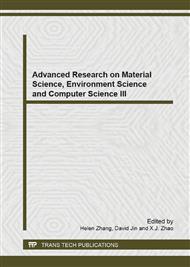[1]
ARI GAMAGE T, CHAPPELL P. . Exploring the potential to use Computer Assisted Language Learning (CALL). University Of Sydney Papers In TESOL [serial online]. June 2013; 8: 57-98.
Google Scholar
[2]
Bax, S. CALL- past, present, future. System, 31, 13-28.
Google Scholar
[3]
Bordbar, F . English Teachers' Attitudes toward Computer-Assisted Language Learning, International Journal Of Language Studies, 4, 3, pp.27-54.
Google Scholar
[4]
Chambers, A., & Bax, S. Making CALL work: Towards normalisation. System, 34, 465-479. http: /dx. doi. org/10. 1016/j. system. 2006. 08. 001.
DOI: 10.1016/j.system.2006.08.001
Google Scholar
[5]
China Internet Network Information Center (CNNIC). Statistical reports on the Internet development in China, at http: /www. cnnic. cn/en/index/0O/02/index. htm, accessed Dec. (2013).
Google Scholar
[6]
Chunqin Zhang, J. A Study of Internet Use in EFL Teaching and Learning in Northwest China, Asian Social Science; Vol. 9, No. 2; 2013, pp.48-52.
Google Scholar
[7]
Davies, G. Computer-assisted language education. In Berns, M. (ed) Concise encyclopedia of applied linguistics. Elservier Ltd.
Google Scholar
[8]
Davis, F. D. Perceived usefulness, perceived ease of use, and user acceptance of information technology. MIS Quarterly, 13, 319-340. http: /dx. doi. org/10. 2307/249008.
DOI: 10.2307/249008
Google Scholar
[9]
Del Puerto, Francisco Gallardo, and Eider Gamboa"The Evaluation of Computer-Mediated Technology by Second Language Teachers: Collaboration and Interaction in CALL. " Educational Media International 46, no. 2: 137-152.
DOI: 10.1080/09523980902933268
Google Scholar
[10]
Guodong Zhao,N. The Findings of Survey on the Developing Situation of the Chinese Education Informatization. China Education 2005-02-28(5).
Google Scholar
[11]
Jinjin Lu, Paul Throssell & Han Jiang, J. Exploring the Application of Computer-Assisted English Learning in a Chinese Mainland Context: Based on Students' Attitudes and Behaviours, International Journal of English Linguistics; Vol. 3, No. 3; 2013. Pp 31-41.
DOI: 10.5539/ijel.v3n3p31
Google Scholar
[12]
Lin Zhihui, D. The study of Multimedia-assisted English Teaching in Senior Middle School, (2011).
Google Scholar
[13]
Ma, W., Andersson, R., & Streith, K. O. Examining user acceptance of computer technology: An empirical study of student teachers. Journal of Computer Assisted Learning, 21, 387-395. http: /dx. doi. org/10. 1111/j. 1365-2729. 2005. 00145. x.
DOI: 10.1111/j.1365-2729.2005.00145.x
Google Scholar
[14]
Mahdi, H. (2013). problems of Computer Assisted Language Learning Normalization in EFL Contexts. International Journal Of Linguistics (IJL), 5(1), 191-203.
DOI: 10.5296/ijl.v5i1.3305
Google Scholar
[15]
Mohamed M, Embi M. Teacher Trainees' Use of Computer-Mediated Tasks in Teaching English as a Second Language: A Preliminary Study. English Language Teaching [serial online]. October 2013; 6(10): 166-178.
DOI: 10.5539/elt.v6n10p166
Google Scholar
[15]
Ngai, E. W. T., Poon, J. K. L., & Chan, Y. H. C. Empirical examination of the adoption of WebCT using TAM. Computers and Education, 48(2), 250–267.
DOI: 10.1016/j.compedu.2004.11.007
Google Scholar
[16]
Nomass, B. The Impact of Using Technology in Teaching English as a Second Language. English Language & Literature Studies, 3(1), 111.
DOI: 10.5539/ells.v3n1p111
Google Scholar
[17]
Qingbin Wang J Home computer ownership and Internet Usage in China: Trends and disparities in home computer ownership in China, Peer-reviewed Journal on the Internet. http: /firstmonday. org/ojs/index. php/fm/article/view/3767/3144.
DOI: 10.5210/fm.v17i2.3767
Google Scholar
[18]
Sun Xianhong, D. A Study on Teacher's Computer Self-efficacy When Integrating Information Technology into College English Curriculum-The Research Based on the College English Teaching Reform in Liaocheng University, Shanghai International Studies University.
Google Scholar
[19]
Walia, D. Technology and English Language Teaching: The Significance and Challenges. E-Proceedings Of The International Online Language Conference (IOLC), 38-47.
Google Scholar
[20]
Wei Jing, D. On Optimizing the Cyber-based Ecological Environment for Foreign Language Learners, Shanghai International Studies University.
Google Scholar
[21]
Wei Zhong, Yanli Fan, Yurong Wang, The Investigation into the Construction and Application of Campus Network in Primary and Middle Schools.
Google Scholar
[22]
Yang, F. Y., & Tsai, C. C. Investigaing university student preferences and beliefs about learning in the web-based context. Computers & Education, 50, 1284-1303.
DOI: 10.1016/j.compedu.2006.12.009
Google Scholar
[23]
Zhang Feng, J. The Basic Rules of Marxist Philosophy Say No" to the Long-standing English Teaching: Taking China, s Large-Scale English Teaching for Example, Studies in Sociology of Science Vol. 2, No. 1, 2011, pp.37-49.
Google Scholar
[24]
Zhaoxia Jiang, J. A Research and Counter-measures of English Cultural Hegemony in China, Asian Social Science Vol. 7, No. 1; January 2011, pp.194-200.
Google Scholar


